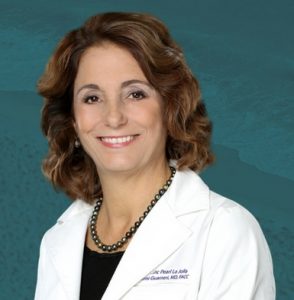ABPS Diplomate Mimi Guarneri, MD: A Holistic Approach to Caring for Your Heart and Overall Health
 Despite all the great work that medical professionals do in the ICU, the cardiac catheterization lab, and in treating heart emergencies, cardiovascular disease is the leading cause of death in men and women globally. In fact, according to the World Health Organization (WHO), about 80% of premature deaths from cardiovascular disease could be prevented through a healthy diet, regular physical activity, and avoiding the use of tobacco. The upshot is that cardiovascular disease is preventable through lifestyle change, and the same is true for diabetes, high blood pressure, and many other diseases.
Despite all the great work that medical professionals do in the ICU, the cardiac catheterization lab, and in treating heart emergencies, cardiovascular disease is the leading cause of death in men and women globally. In fact, according to the World Health Organization (WHO), about 80% of premature deaths from cardiovascular disease could be prevented through a healthy diet, regular physical activity, and avoiding the use of tobacco. The upshot is that cardiovascular disease is preventable through lifestyle change, and the same is true for diabetes, high blood pressure, and many other diseases.
Obesity & Heart Disease
One of the epidemics in the United States is obesity. Other health conditions can help explain why this is the case. For instance, one in 10 adults has diabetes, which is almost 10% of the world’s adult population. People with diabetes have an increased risk of heart disease and stroke. We are now seeing a rise in non-alcoholic fatty liver disease (NALFD), which is like insulin resistance in the liver. If the current rate of obesity and diabetes continues for another 20 years, the prevalence of NALFD in the United States is expected to increase by 50%.
Blood Pressure
Blood pressure is intimately related to cardiovascular disease. What many people do not realize is that normal blood pressure for most of us is 120/80 or below, not 130 to 139/80, which is already Stage 1 hypertension.
Body Fat
Heart disease is linked to where we have fat. For example, some of us carry extra weight in the midsection, while others typically have weight in the subcutaneous tissue in the buttocks area. When it comes to body composition, it’s important to recognize patterns. For instance, having an apple-shaped body, or having extra visceral adipose tissue, can predispose one to diabetes or inflammation. This tissue can produce inflammatory cytokines that can cause heart disease and cognitive decline. What’s more, inflammation is linked to heart disease. So, just carrying extra weight can affect how we feel. We now know through the language of science that chronic inflammation can affect the brain, causing what we call cytokine sickness, which is marked by depression and chronic fatigue.
“Good” & “Bad” Cholesterol
Cholesterol is important to the heart—more, specifically, it’s the type and makeup of your cholesterol that matters. My patients say that the “L” in LDL, which is known as the “bad” cholesterol, stands for “lousy,” and the “H” in HDL, known as the “good cholesterol,” stands for happy. It’s not as simple as that, however. People with diabetes, for example, may have LDL cholesterol with very small particles that are aggressive. Having a lot of LDL particles called LDLP and many small particles increase risk. This means that we don’t just look at the total cholesterol. Rather, we need to look at all of the lipoproteins so that we can determine the true risk. When we consider cholesterol as a risk for cardiovascular disease, we should consider particle number, whether we have too many LDL particles, or if our HDL (good cholesterol) particles are low—all of which can put us at risk. And, remember, LPA may pose a greater risk and should be checked in individuals with premature heart disease or a strong family history.
Inflammation
Cardiovascular disease is linked to the process of inflammation, which is a consequence of diabetes, obesity, and a host of other conditions. Inflammation in the mouth can cause inflammation in the whole body and place you at risk for cardiovascular disease as well as cognitive decline, arthritis, and other problems. Food sensitivities, sleep apnea, heavy metals, and the gut microbiome are all sources of inflammation.
Diet
The well-known Lyon Heart Study evaluated how the Mediterranean diet affected people with heart disease. It showed that the diet resulted in a 70% reduction in overall mortality and a 73% reduction in heart attacks. A more recent study of people with high cardiovascular risk, the Predimed study, showed that a Mediterranean diet supplemented with lots of extra virgin olive oil and nuts resulted in a 30% reduction in major cardiovascular events. Food is medicine!
Lifestyle as an Intervention.
Genetics is not our destiny. We may be predisposed to a certain disease, but in the right environment, we may never develop that disease. Ultimately, a favorable lifestyle, which includes such factors as getting enough sleep and exercise and adding more plant-based foods to our diet, is associated with a substantially lower risk of coronary events when compared to an unfavorable lifestyle.
Mimi Guarneri, MD, is a board-certified physician in cardiovascular disease, internal medicine, and integrative holistic medicine, and a founding board member of the American Board of Integrative Medicine® (ABOIM®), which is governed by the American Board of Physician Specialties® (ABPS).










